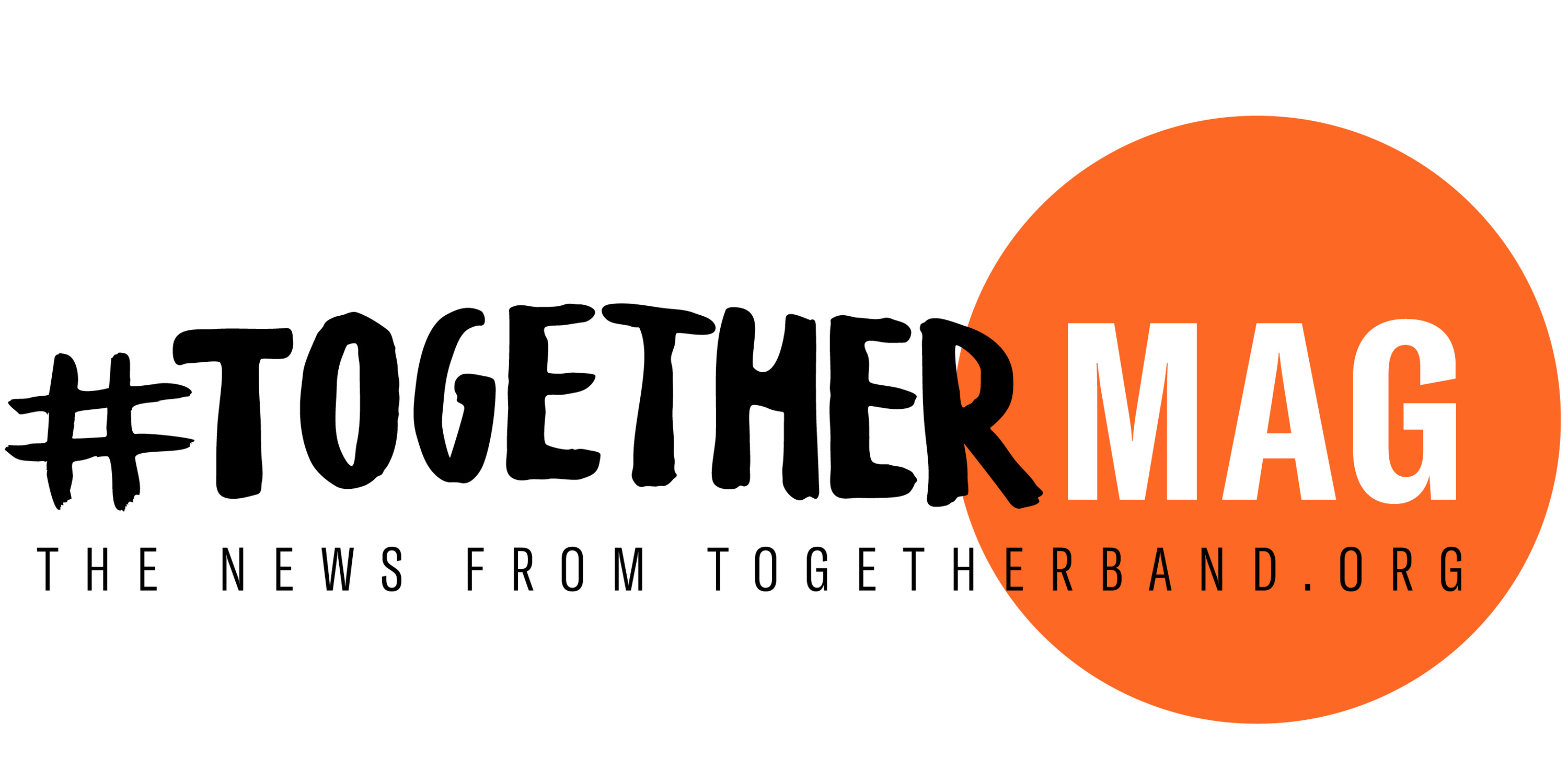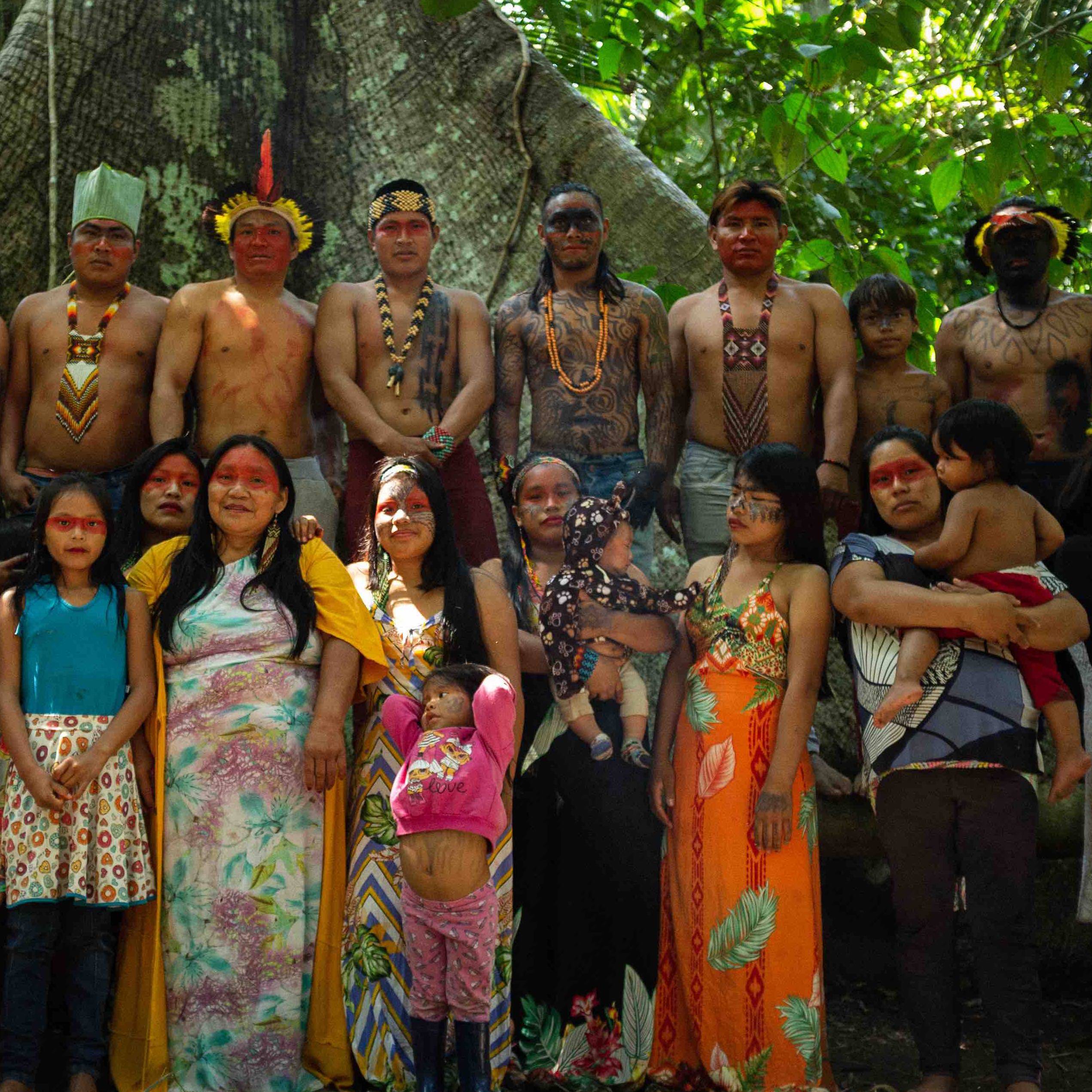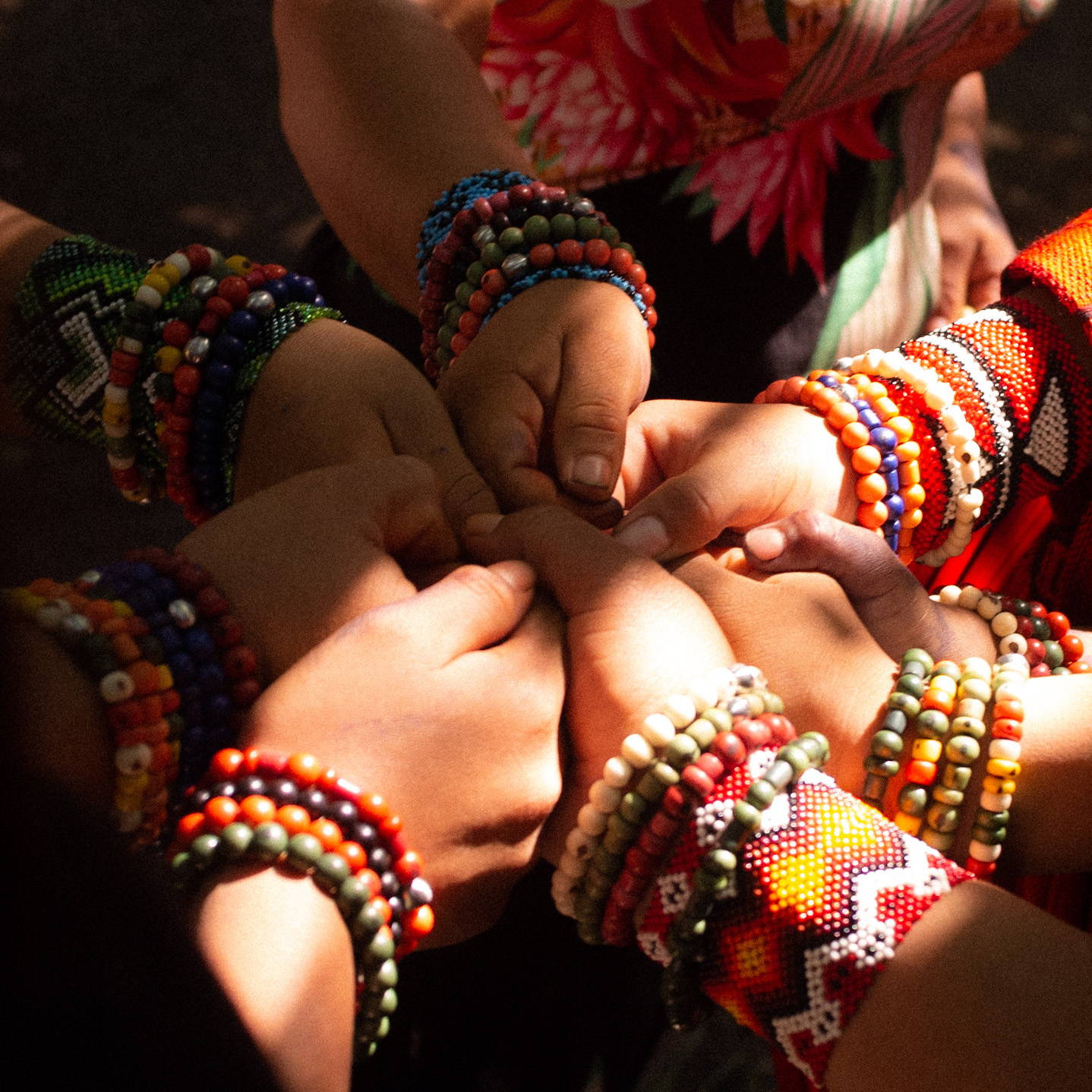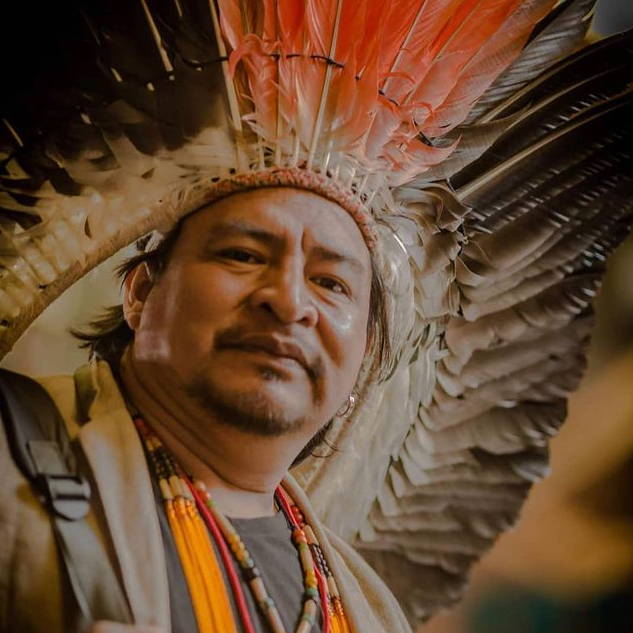
Image: @tashka_yawanawa
Goal 13: Climate Action
Meet tashka, chief of the yawanawá
Tashka Yawanawá and his wife Laura share their battle to protect the Brazilian Amazon and what our Yawa #TOGETHER collection means to them
By EMMA ELMS
21 april 2022
‘The forest means life to us. Every time an Indigenous person goes into the forest they feel peace, they feel love and they feel touched by the spirit. It is like you are back in your natural home.’ Speaking to Tashka and his wife Laura over video, you can see blue skies and lush Brazilian rainforest swaying gently. For us, this is a depiction of paradise, but for them, it’s even more – their connection to nature runs so deep, it’s part of their soul and psyche.
The Yawanawá are an incredible community. Based in the Western tip of Brazil, they have lived in the Acre region, deep within the rainforest for hundreds of years. To reach their village it’s a 12-hour journey by bumpy road, then another six hours by boat, from the state of Acre’s capital city of Rio Branco, which is over four hours by plane from Sao Paulo. For years, they have survived being enslaved and having their land, resources, traditional customs and livelihoods stolen. Sadly, the threats they face are far from over, with forest fires, deforestation, illegal logging, climate change and a proposed new bill that puts their sacred homeland at risk.
Image: Tashka and Laura Yawanawá
Our Yawanawá connection
#TOGETHERBAND’s special relationship with the Yawanawá community began back in January 2020 when our Co-Creator Cameron Saul decided to go on a week’s solo trip to their rainforest home, nestled deep within the Brazilian Amazon. Inspired by his friend Lily Cole, the activist, author, supermodel and actress, who had visited the community several years earlier, his mission was to experience the Yawanawá way of life and see first-hand how they care for and protect the rainforest. This meeting sparked #TOGETHERBAND’s collaboration and the Yawa #TOGETHER collection was born, starting in September 2021 with our Yawa Band Kickstarter; the bands are made from the seed waste of the rainforest’s precious açaí fruit, providing vital work opportunities for the Indigenous peoples.
‘We were looking for a partner who could help us do something bigger with the açaí seeds and use the art and talents of the Yawanawá in different crafts, so meeting Cameron really was a blessing to us,’ smiles Laura. ‘We learned he was already running a sustainable business with bags made from bottle tops and saw the opportunity. He also got the chance to see some of the amazing arts and crafts we were already making with açaí seeds.’
Amazon under threat
‘Our precious forest is under great threat,’ says Tashka. ‘It’s burning. We protect the forest and she protects us. We live in harmony. The forest provides us with medicine, shelter, sacred knowledge and with a livelihood. A healthy forest is vital not just for us, but for the healthy future of all humankind. We are partnering with #TOGETHERBAND to create the Yawa #TOGETHER collection as a symbol of hope for the future of the forest and our community. With these bands and necklaces we can preserve the cultural heritage and crafts of our community and provide a livelihood for our people.’
One of the most imminent threats to the rainforest and the Yawanawá people is from the Brazilian government itself, which is trying to pass bills that would threaten Indigenous land rights by legitimising land grabbing, which is currently illegal, and putting communities' very survival at risk. It would also inevitably lead to the heightened destruction of the Amazon, home to 900,000 Indigenous peoples, to make way for beef cattle and soy crops, as well as for potash mining. President Jair Bolsonaro has repeatedly expressed his wish to loosen regulations in the Brazilian Amazon and showed a lack of respect for the country’s Indigenous peoples.
‘There is persecution against Indigenous peoples and our territories because the current government thinks we have too much land and that we are not doing anything with it,’ says Laura in desperation. ‘The current government wants us to sell our land for cattle, for plantations, for mega projects and it’s terrifying because they are trying to introduce laws that violate our rights to the land.’
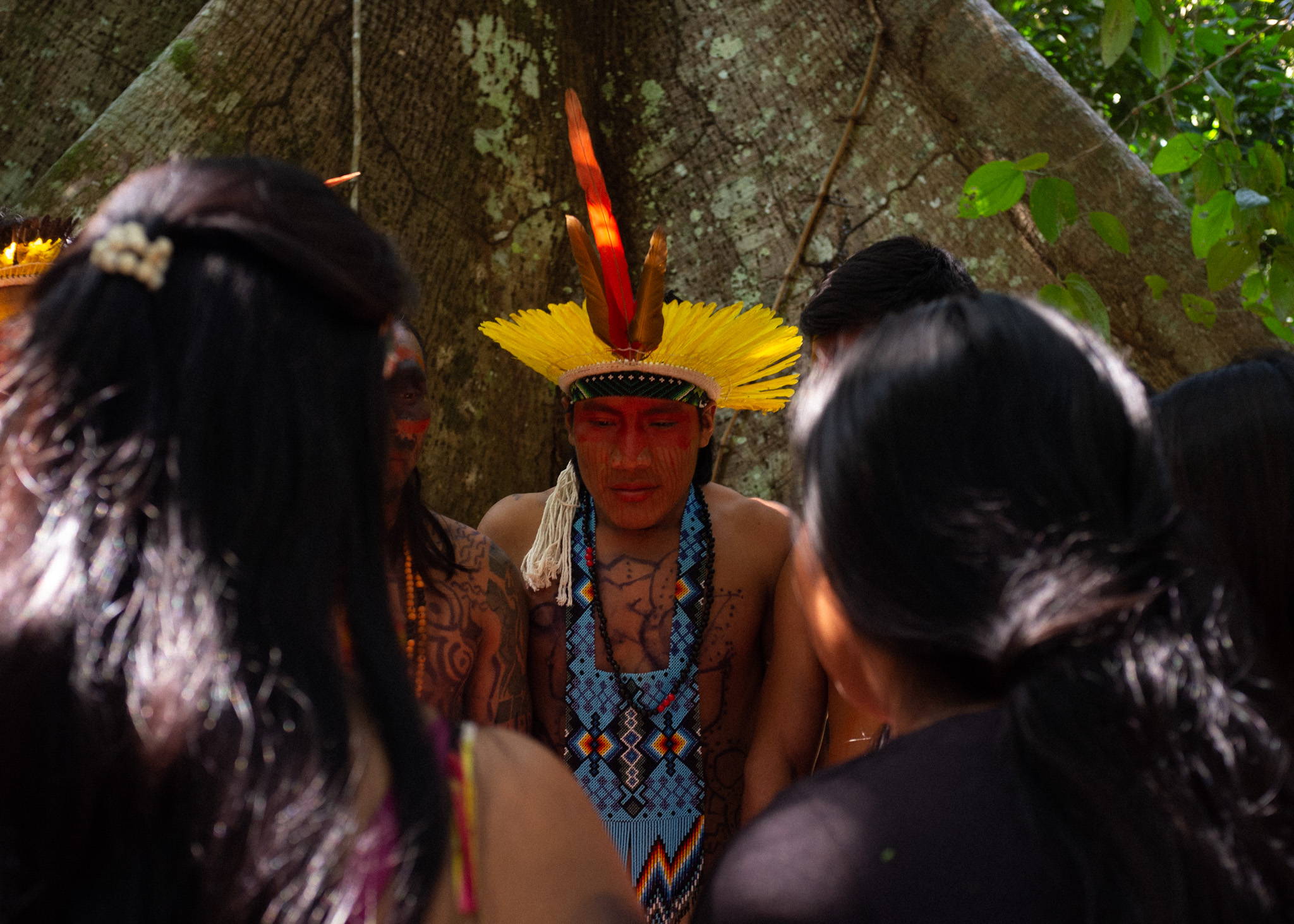
Image: @maiharamarjorie
The ancestral land of the Yawanawá community was legally marked out by the Brazilian government in the 1980s, with an area of 92,860 hectares. ‘In 2005 we asked the government to revise our territory again, increasing it to 200,000 hectares. This meant the Yawanawá could live in peace.’
Illegal logging and wildfires are other daily threats. ‘The reality is the Amazon is burning,’ says Laura. ‘The sky looks very red because of the burning and a lot of the Yawanawá children got sick with colds and coughs.’
Some forest fires occur naturally, but many are started deliberately as part of deforestation in the Brazilian Amazon, which has hit the highest annual level in a decade – 10,476 square kilometres of forest was lost between August 2020 and July 2021, an area seven times bigger than London, according to Imazon, a Brazilian research institute. The figure was 57% higher than the previous year.
The climate crisis
The weather extremes linked to global warming are another ongoing battle. ‘With climate change, Indigenous peoples are the most affected because we are totally connected with the land,’ says Laura. ‘The land is our life, it’s our food, it’s our local pharmacy because it has medicinal plants and it’s like our supermarket because it’s where we find fruit like the açaí.’
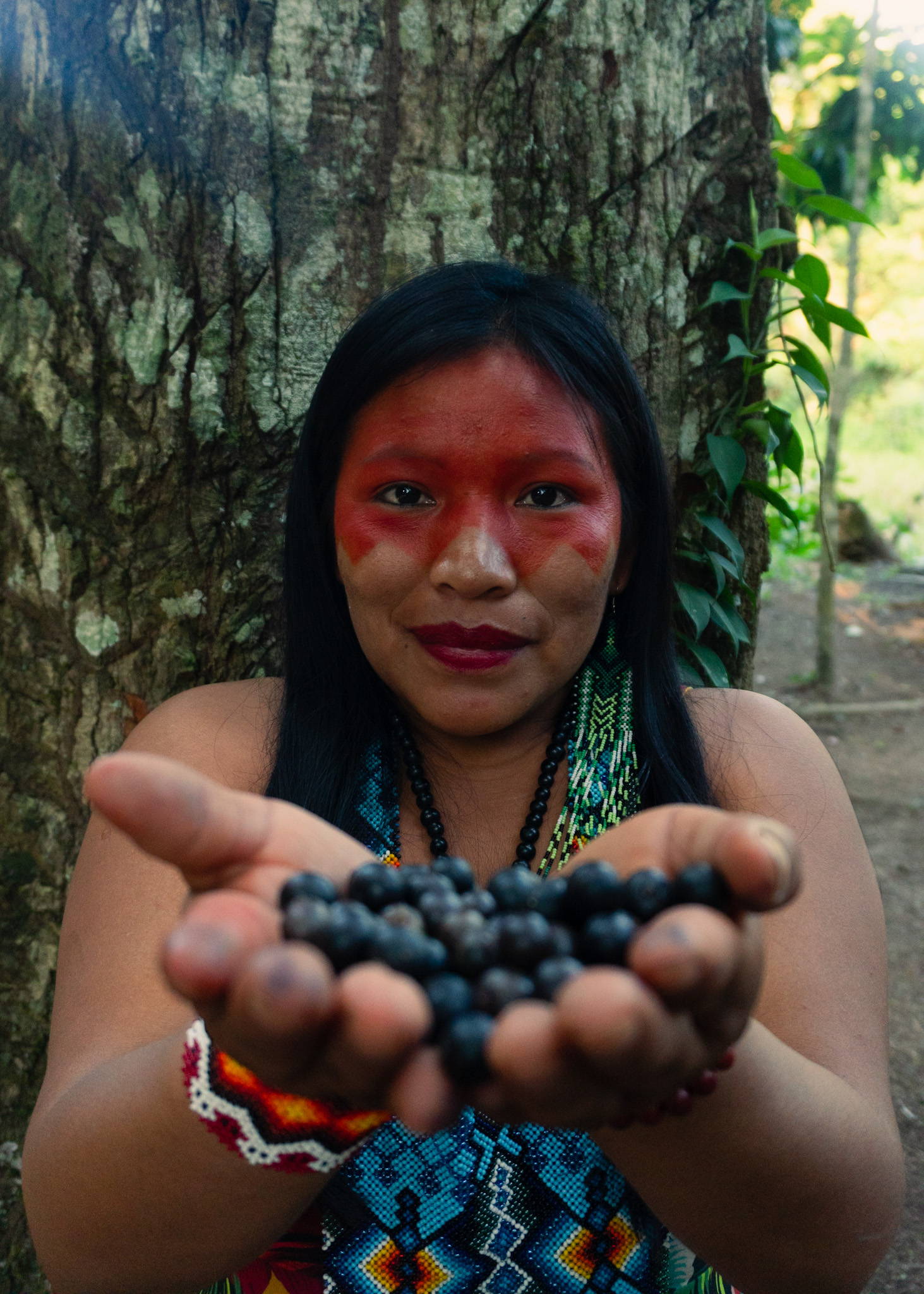
Image: @maiharamarjorie
‘Right now, we are suffering because the dry season has been too dry and hotter than ever,’ adds Laura. ‘The temperature has been in the 40s and it feels even higher. Then in the winter there is so much rain. We’ve had floods that we didn’t have before.’
At the start of this year the community was hit by major floods. Their traditional homes are built from wood from the forest, with the ceilings made from palms. ‘During the floods, some families lost small animals, like chickens, then one year it was very bad. In 2015 some people even lost their homes. Our own home has been flooded twice too.’
Yawanawá – the history
The Yawanawá has faced challenges from both people and the planet over the years. When Tashka was a child, he recalls them being considered second-class citizens in Brazil, their work exploited by rubber barons and their spiritual beliefs denigrated by missionaries. ‘In the early 1980s we were just 120 people and today we are about 1250 people,’ he says.
Taskha went on to win a scholarship at a university in Rio de Janeiro to study computer sciences and later won a grant from Aveda to study at the University of California, Santa Barbara. He stayed there for five years and travelled widely, throughout the US and Mexico, becoming closely involved in the Indigenous rights movement. It was there he met his future wife Laura, an activist from Mexico, who has a degree in International Relations and speaks four different languages. Together, they’ve both worked for the rights of Indigenous peoples all over Latin America, becoming spokespeople for the Yawanawá and raising awareness of the plight of the Amazon through platforms such as this powerful TED talk in 2019.
Image: Laura Yawanawá
In 1993, there came a major commercial breakthrough. ‘The Yawanawá was always looking for a project to find a sustainable way to use mother nature’s resources without destroying our environment and our culture,’ explains Tashka. ‘At the time, the Aveda Corporation was looking for a natural colour. Now we still work with them every year. We give them a quantity of Urucum seeds, a natural colour we use to paint our face and body. From this natural seed, Aveda can make shampoo, lipstick and all kinds of products.’
What Laura loves about the Aveda partnership is that they can provide a relatively small quantity of Urucum, which is ‘manageable’, and which they are paid fairly for. ‘What they really pay the Yawanawá for is the use of our image and our name. Aveda has a mission to support the preservation of the land and support our social projects which are part of our Life Plan.’
The treasures of the rainforest are revered by the community and Tashka is currently writing a book about the medicinal powers of its plants, using traditional wisdom.
The power of nature
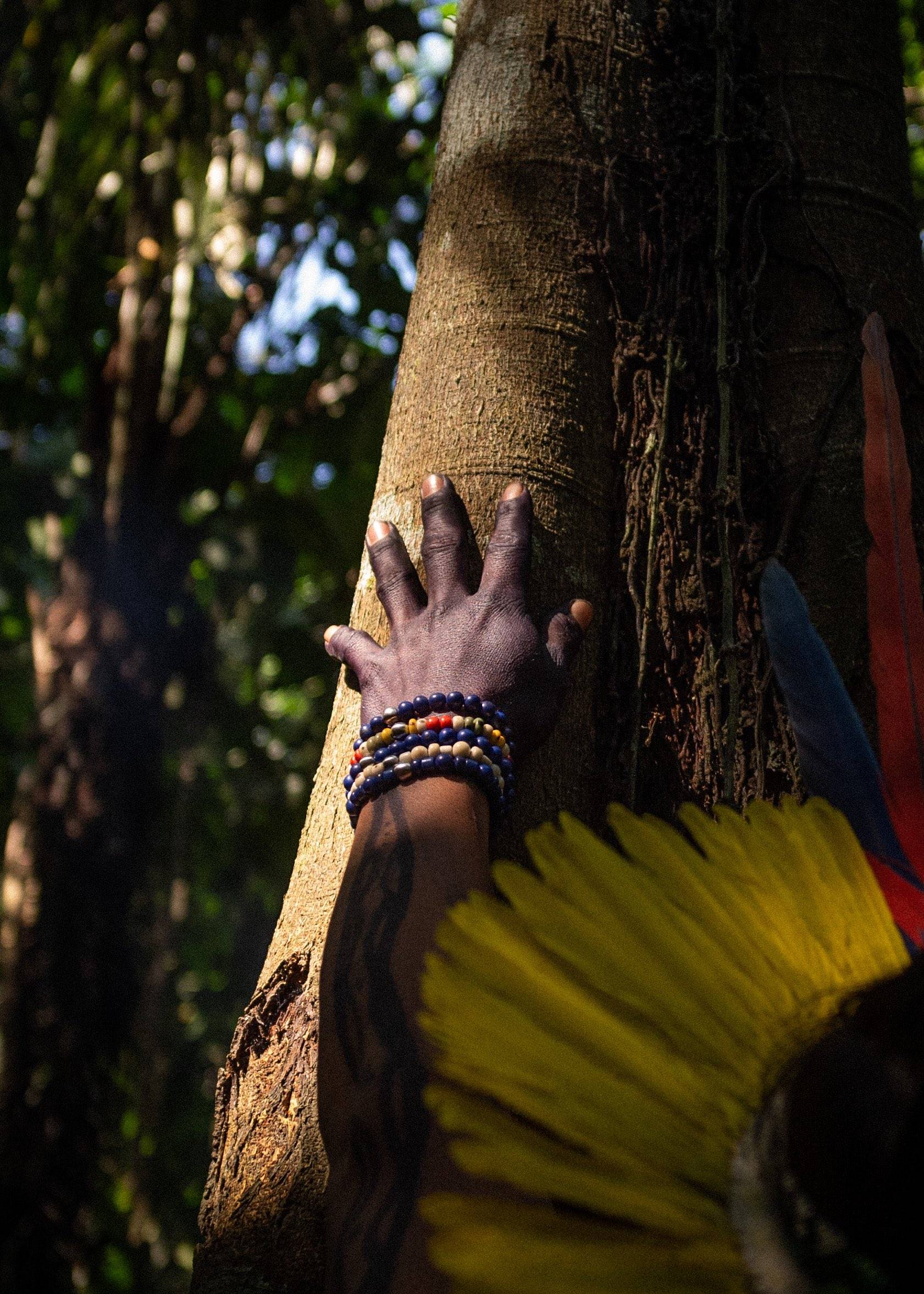
Our Yawa Bands
Image: @maiharamarjorie
‘Our mission for nature makes us different from other people,’ says Laura. ‘We don’t see a tree like a piece of wood. We see a tree as a spirit. If we take one leaf from the tree we are hurting the tree. If our medicine man wanted to take a leaf from the tree for healing he would ask permission from the tree.’
Giving a powerful insight into the Yawanawá philosophy, she explains, ‘If you do anything with that leaf, like make tea or have a bath using it, you have to do a kind of ‘diet’ because you have to respect the spirit of the tree. So you can’t have sexual relations, you can’t eat sweets or eat meat, because you put inside you some of the spirit of this tree, some of the knowledge and healing of the tree, so you have to respect that spirit. The spirit blesses you and it’s very beautiful.’
In a bid to preserve Yawanawá traditions like these, 20 years ago, the couple started a festival called YAWA, a weeklong annual event with singing, dancing, art and cultural expression. ‘Tashka and I invented this because at the time many of the traditions were disappearing, so we went to the elders and asked, “What shall we do to strengthen the culture and traditions?” It was an amazing celebration of the Yawanawá. Tashka’s dad cried at the time when he saw everybody painted and in traditional dress, saying, “Now I can die happy because I saw my people again the way they were.”’
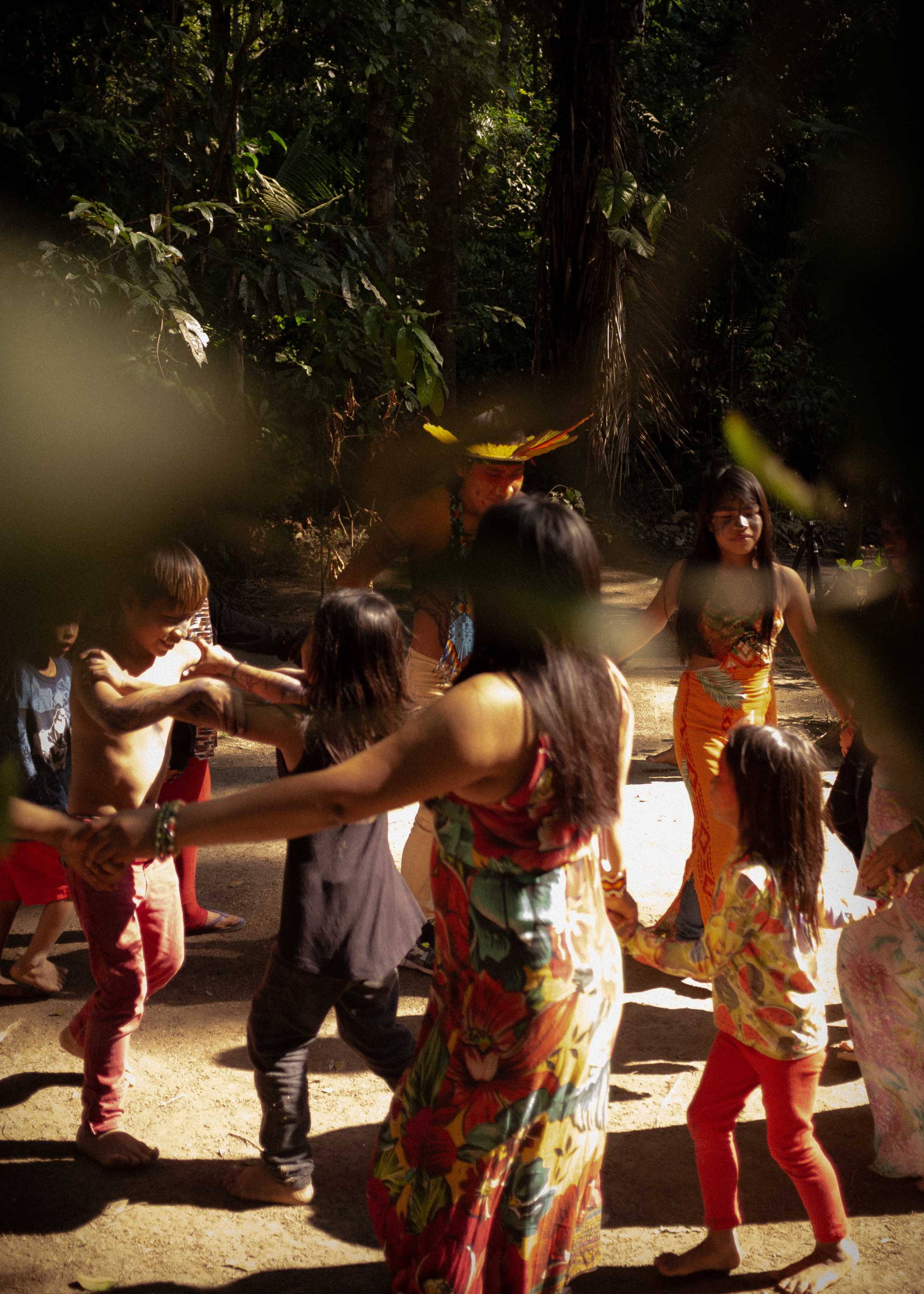
Image: @maiharamarjorie
The modern Yawanawá
Although the Yawanawá community used to be quite patriarchal, it has moved with the times and now women play a more prominent role. ‘In the Yawanawá tradition women were not allowed to be chairmen, but we were able to break that taboo and have created a whole new model of governance over the past 20 years. The Yawanawá Leadership Council is composed of one woman and one man from our seven communities with equal voice and vote. Now women have the same power of decision.
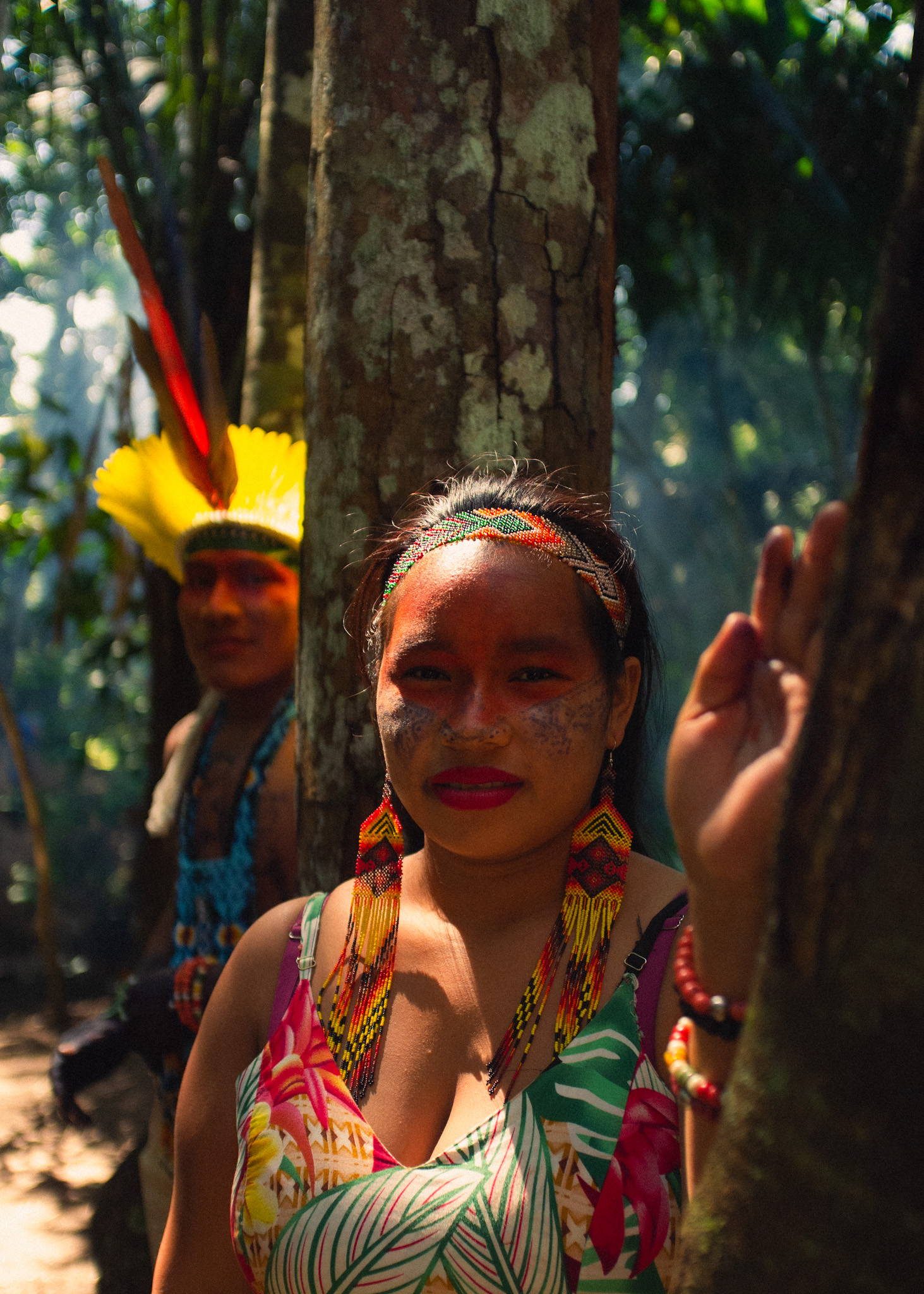
Image: @maiharamarjorie
At the Yawanawá school, children are educated in both mainstream subjects and Yawanawá traditions. ‘They learn from a young age to always be supportive and kind to their elders, how to fish, how to support their family, so children in our community are very happy and helpful.’
The community’s electricity is provided from a generator, though one day they hope to have solar-power – even dreaming of solar-powered boats, instead of relying on gas and diesel. There is no mobile phone reception but they can use WhatsApp, as WiFi comes via satellite.
The outside world may feel a million miles away but protecting communities like these is critical for the survival of our planet. ‘The rainforest is what produces the rain, it makes the equilibrium of the Earth, but it’s also about our traditional knowledge which helps us to protect this land,’ says Laura. ‘We have to take care of the trees, the water, the birds and all biodiversity, because these are our teachers.’
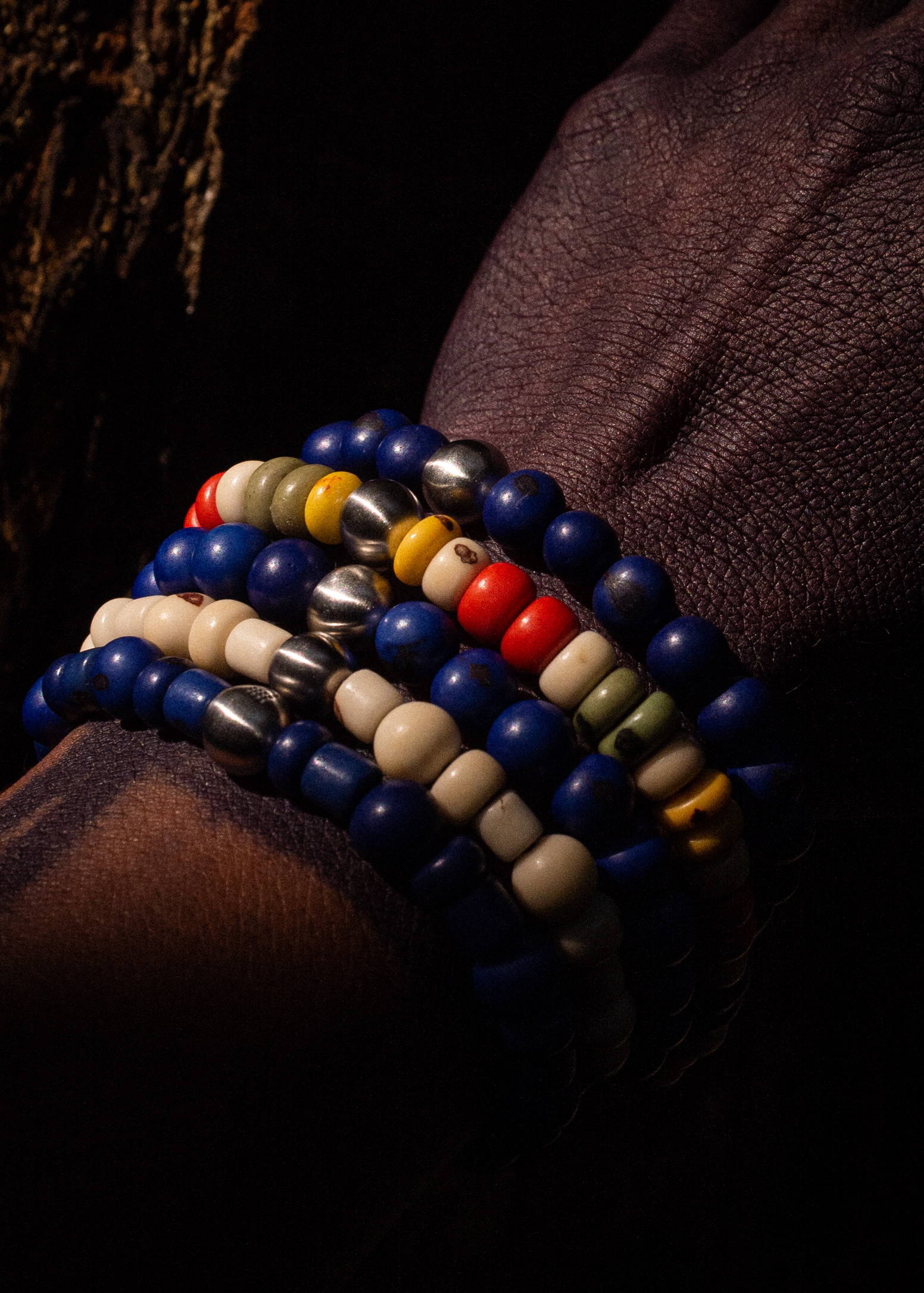
Our Yawa Bands
Image: @maiharamarjorie
We have collaborated with the Yawanawá to make the Yawa #TOGETHER collection in the heart of the rainforest, bracelets and necklaces created from ácaí seed waste and Parley Ocean Plastic®️, each featuring a single Humanium Metal bead, made from melted down seized illegal firearms.
This interview was originally published in conjunction with our Kickstarter in September 2021 and has since been updated
100% of profits from the sales of Yawa #TOGETHER products go to the Yawanawá community
